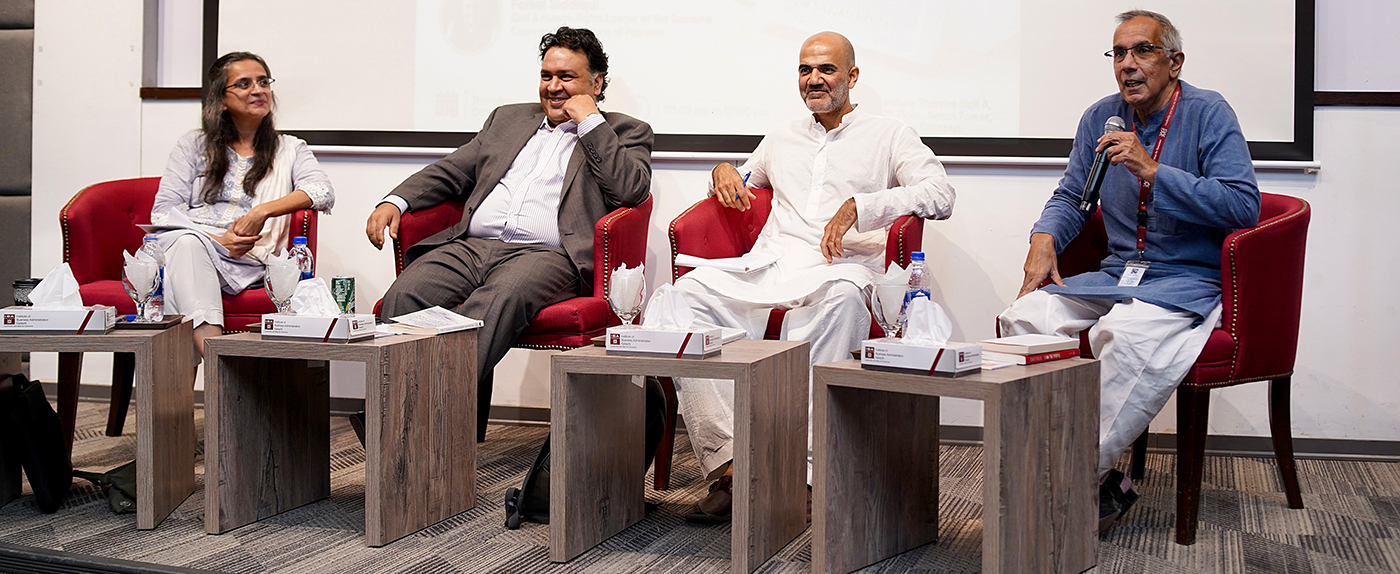IBA Karachi hosted a book launch for the book 'The Struggle for Hegemony in Pakistan'
October 06, 2022: The Institute of Business Administration (IBA), Karachi held a book launch for Dr. Aasim Sajjad Akhtar's book, 'The Struggle for Hegemony in Pakistan: Fear, Desire and Revolutionary Horizons' at the IBA City Campus. Attendees included the IBA faculty, students and alumni and members from the academia.
The discussion featured, Dr. S Akbar Zaidi, Executive Director, IBA Karachi; Dr. Aasim Sajjad Akhtar, Associate Professor of Political Economy, National Institute of Pakistan Studies, Quaid-e-Azam University and Leader, Awami Workers Party (AWP); Ms. Abira Ashfaq, Visiting Faculty, IBA Karachi and Member, Karachi Bachao Tehreek; and Mr. Faisal Siddiqui, Civil and Human Rights Lawyer at the Supreme Court and High Courts of Pakistan.
Dr. Zaidi commenced the event and introduced the panelists. He introduced Dr. Akhtar as an exceptional author and said that he had surpassed himself in his latest book with new topics resulting in the form of an exciting and profound book.
Dr. Akhtar thanked Dr. Zaidi for the opportunity and said that using his poetic license, he has taken the book in various directions. He talked about the digital age and how politics have evolved in the past 20 years due to digitalization. He stated that today's revolutionaries were more likely to update their social media with their ideologies rather than visit devastated places to revive them.
The collapse of neoliberal hegemony in the western world following the financial crash of 2007-8 and the subsequent rise of right-wing authoritarian personalities is described as a crisis of 'the political' in western societies. But the crisis must be seen as global, rather than focusing on the west alone. Pakistan is experiencing rapid financialization and rapacious capture of natural resources, overseen by the country's military establishment and state bureaucracy. Under their watch, trading and manufacturing interests, property developers and a plethora of mafias have monopolized the provision of basic needs like housing, water and food. The author explores neoliberal Pakistan, looking at digital technology in enhancing mass surveillance, commodification and atomization, as well as resistance to the state and capital. Presenting a new interpretation of our global political-economic moment, he argues for an emancipatory political horizon embodied by the 'classless' subject.
Furthermore, currently 65% of Pakistan's population is under 30 and can be influenced with strategical social media campaigns. Various popular political leaders in South Asia have won due to social media and did not need the mainstream media to win political campaigns. He also equated the youth as the middle-class and assessed that the middle-class plays an integral role in the present political scenario of the country and since the middle-class is motivated by the desire for upward mobility, political leaders use it as a bait to come into power. Dr. Akhtar opined that to bring about a revolution, a universal, united political system is needed to solve global key issues.
Reviewing the book, Mr. Siddiqui classified the book as theoretical and said that the author wants to transform the readers into revolutionary agents. He said that the book goes back to the Grand theory, Marxism and revolves around universal politics. The book explains why the middle-class desires and accepts dominance as per Gramsci's ideology. He said that religion is the opiate of the masses and South Asian politicians need to acknowledge its importance and influence on the masses. He further added that the middle-class ideology has reached the judiciary for the first time in Pakistan's history.
Ms. Ashfaq appreciated the book and said that the case studies on Bahria Town and Thar coal were enlightening. Shedding light on the hegemony of leading international financial aid organizations and multinationals, she said that their obsolete policies should be challenged and revised for the betterment of the common people. Speaking about migration, climate change and agricultural work issues in Pakistan, she said that all of these were extremely hard on women as they usually got the hardest jobs or were adversely impacted. Explaining the fundamentals of feminism, she said that the ideology was anti capitalism and said that even in 2022 the female representation was insignificant in most professions including the judiciary and academics.
Concluding the discussion, Dr. Zaidi said that "After all the revolutions, it is ironic that the global world is back to the time when the middle-class is the savior. And although it is good to aspire, but it seems that no immediate revolution is on the horizon, which is quite tragic."

